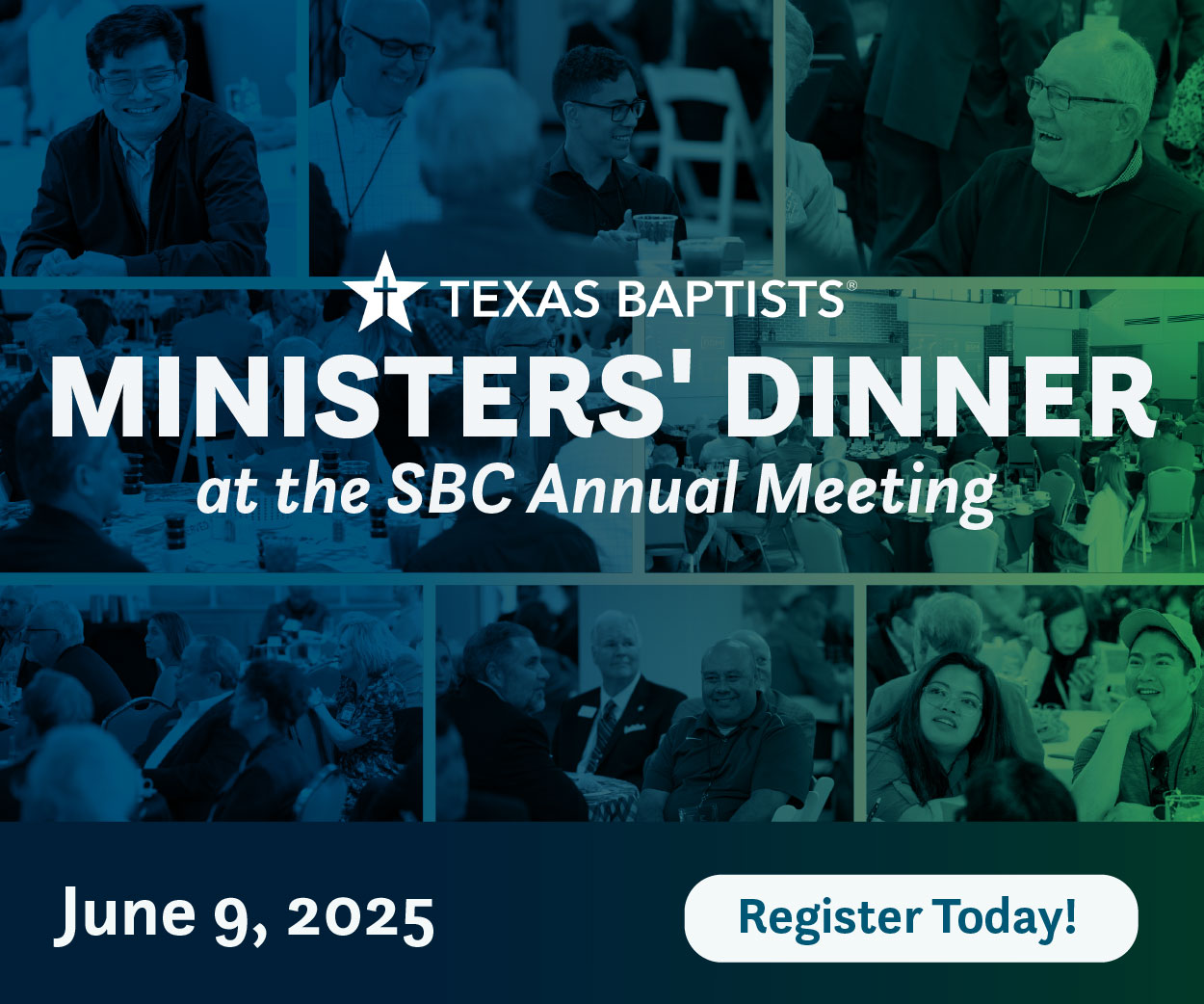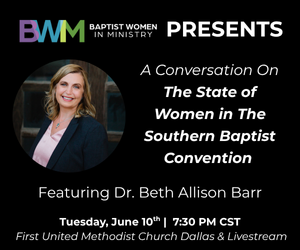Joseph Christopherson has been the executive director of El Paso Baptist Association since 2008. From deep in the heart of one Texan, he shares his background and thoughts on associational ministry and the church. To suggest a Baptist General Convention of Texas-affiliated leader to be featured in this column, or to apply to be featured yourself, click here.
Background
Joseph Christopherson was born in Minneapolis, Minn., and moved with his parents and siblings to Michoacán, Mexico, when he was 3 years old. Joseph’s father served in World War II as a surgical tech medic in the European Theater of Operations, where his unit—The Timberwolves—was one of the concentration camp liberators in 1944. After discharge, his father completed seminary and went to Mexico as a missionary.
Where else have you worked, and what were your positions?
I served in the United States Air Force as a radar operator and then became an FAA-licensed air traffic controller.
I served as the senior pastor of Second Creek Christian Center in Kansas City, Mo.; supervisor for the Harris County Community Supervision and Corrections Department in Houston; director of Mesilla Valley Mental Health Hospital’s home-based programs in Las Cruces, N.M.; executive pastor for Coronado Baptist Church in El Paso; senior pastor of NorthSide Baptist Church in Arlington; director of growth and healing at Bethel Baptist Church in Richland, Wash.; and as a solo practitioner of psychotherapy in El Paso.
I am also an associate adjunct professor at Webster University’s Fort Bliss Campus and Howard Payne University’s El Paso Campus.
Where did you grow up?
I grew up on the mission field in Michoacán, Mexico.
How did you come to faith in Christ?
When I was 9 years old, my youngest sister, Anna, died as the result of falling while playing with her friends. This tragedy for my family convinced me I should put my faith in Jesus Christ and become a Christian. Three years later, at age 11, I was baptized.
Where were you educated, and what degrees did you receive?
I earned my bachelor’s degree from William Jewel College in Liberty, Mo., studied at Midwestern Baptist Theological Seminary in Kansas City, Mo., earned a master’s degree from Houston Graduate School of Theology, and earned a doctorate in organizational leadership from Grand Canyon University in Phoenix, Ariz. My doctoral dissertation is published in ProQuest and also was published under the title Wild Oats: An Honest Look at God’s Redemptive Character by Westbow Press.
About Ministry
Why do you feel called to your particular vocation?
The calling to serve as an associational director was the culmination of many years of being a pastor, running nonprofit organizations and a deep sense of calling to be a missionary.
Sign up for our weekly edition and get all our headlines in your inbox on Thursdays
Please tell us about your association—where it’s located, the key focus of its work and ministry, etc.
Our association is located close to the center of El Paso, a city of approximately 800,000 people. Including the colonias and the 1.5 million people across the southern border, the El Paso region is well over 2 million people. El Paso is an interesting city that borders two countries, two states (Texas and New Mexico) and three military bases (Fort Bliss, Biggs Airfield and White Sands Missile Range) and is home to a four-year medical school, several universities and much more.
The association is called to minister to all of these facets of the city and is based on five priorities: church strengthening, church starting, community building, the Leadership Institute and the Aspendale Baptist Encampment located in Cloudcroft, N.M.
What do you like best about leading your association? Why?
The best part of being the associational leader is exposure to terrific, hard-working pastors and church leaders who represent the front lines of the spiritual battles raging through the area. The area is a high human trafficking area and a high drug smuggling corridor. The El Paso region offers the opportunity to minister to the Hispanic community as 85 percent of our population originated from Latin America.
What aspect(s) of associational ministry and/or its mission do you wish more people understood?
I wish our Baptist community would realize the potential of churches working together. Church leaders over the last 100 years have emphasized church autonomy at the expense of losing church cooperation, volunteerism and a wider view of city or regional responsibilities.
How has your association and its mission changed since you began your career?
We have restructured the association to function a bit more stealthily by reducing the numbers of people and layers of bureaucracy in terms of decision-making. These changes have increased ministry opportunities and reduced the friction that often draws energy and focus from the “main thing.”
How do you expect your association and/or its mission to change in the next 10 to 20 years?
The association will no doubt change for the better in the next decade as churches become more technologically adept, pastors become better trained, and church leadership draws from the resources available from our younger Baptists.
Name the three most significant challenges and/or influences facing your association.
- The biggest challenge for the association is the waning of denomination loyalties.
- The shrinking of the donor base as more, and more outside ministries—valid as they may be—fight for a piece of the funding pie both locally and statewide.
- In this association, there is a strong influence on our church members and leaders to acquiesce to the increasing demands of other religions, politically correct speech and the need for Christians to “walk carefully” lest they offend someone with the truth and grace found in Scripture (John 1:14, 17; Galatians 1:6).
What one aspect of your job gives you the greatest joy or fulfillment?
I derive joy from meeting with and getting to know pastors, teaching when the opportunity is given, administrating the organization to maximize ministry potential, and helping churches realize the need for Christian community.
About Baptists
What are the key issues—opportunities and/or challenges—facing Baptist churches?
- Many churches are faced with diminishing congregations, dilapidated buildings, high overhead and decreasing tithes and offerings.
- Many churches are distracted from the presentation of the gospel with community events that attract people but may not increase church attendance or membership.
- Many churches in our association struggle with the ability to preach, teach and serve the community with relevance and create environments that attract and maintain pre-believers, new Christians and unbelieving people.
What are the key issues facing Baptists as a people or denomination?
There is a waning sense of loyalty to the association, state conventions and the national convention. The newest generations—Millennials and Gen Z—are not particularly attracted to old-school loyalties as are the Baby Boomers, who learned from the Builders—the Greatest Generation. Associations and churches must change their paradigm to understand what the 20- and 30-year-olds are thinking and needing in their lives.
What would you change about the Baptist denomination—state, nation or local?
I would purposefully revamp the Baptist system to reduce layers of bureaucracy in terms of offerings and relationships. Regional associations often feel left out of the loop when state or national conventions work directly with churches. Perhaps associations should be re-invented to serve the churches as opposed to be expected to serve the state and national conventions.
About Joseph
Who were/are your mentors, and how did/do they influence you?
My mentor is Mike Woods, a Baptist pastor here in El Paso. Pastor Mike is a seasoned, balanced pastor whose ministry has flourished and whose emphasis on God’s word and personal discipleship literally has increased the Christian community. My mentor influenced me when he and his leaders responded to the Lord calling me back into ministry after a 10-year hiatus from pastoral service.
Mentorship is critical for an associational director, as there are many discouragements and trials that go unspoken often.
Other than the Bible, name some of your favorite books or authors, and explain why.
- Spiritual Leadership: Moving People on to God’s Agenda, Revised and Expanded by Blackaby and Blackaby (B&H Books, 2011)
- Quiet Strength: The Principles, Practices, and Priorities of a Winning Life by Tony Dungy (Tyndale, 2008)
- Integrity: The Courage to Meet the Demands of Reality by Henry Cloud (Harper Collins, 2009)
The above books are only a sample of books I’ve read in the last few years. They are applicable to what I do as an executive director.
What is your favorite Bible verse or passage? Why?
My favorite passage in terms of my job is Psalm 72:78: “So he shepherded them according to the integrity of his heart, and guided them with his skillful hands.” This verse encapsulates what a leader is—a heart of integrity and skill.
Who is your favorite Bible character, other than Jesus? Why?
My favorite biblical character is Nehemiah.
Name something about you that would surprise people who know you well.
I have lead worship in the past, and singing was my forte in my younger days.
If you could get one “do over” in your career, what would it be, and why?
My career decisions early on following military service may have been different. However, God is sovereign “and we know that God causes all things to work together for good to those who love God, to those who are called according to His purpose” (Romans 8:28).
What were the most difficult moments or days on the job?
- Not sensing that the associational churches are praying for me when difficult decisions are at hand.
- Sensing that I have very little influence when churches and leaders ask my counsel, then fail because they did what they wanted anyway.
- Missing the fellowship of a church fellowship due to the demands of visiting and preaching in various churches over the years.
















We seek to connect God’s story and God’s people around the world. To learn more about God’s story, click here.
Send comments and feedback to Eric Black, our editor. For comments to be published, please specify “letter to the editor.” Maximum length for publication is 300 words.